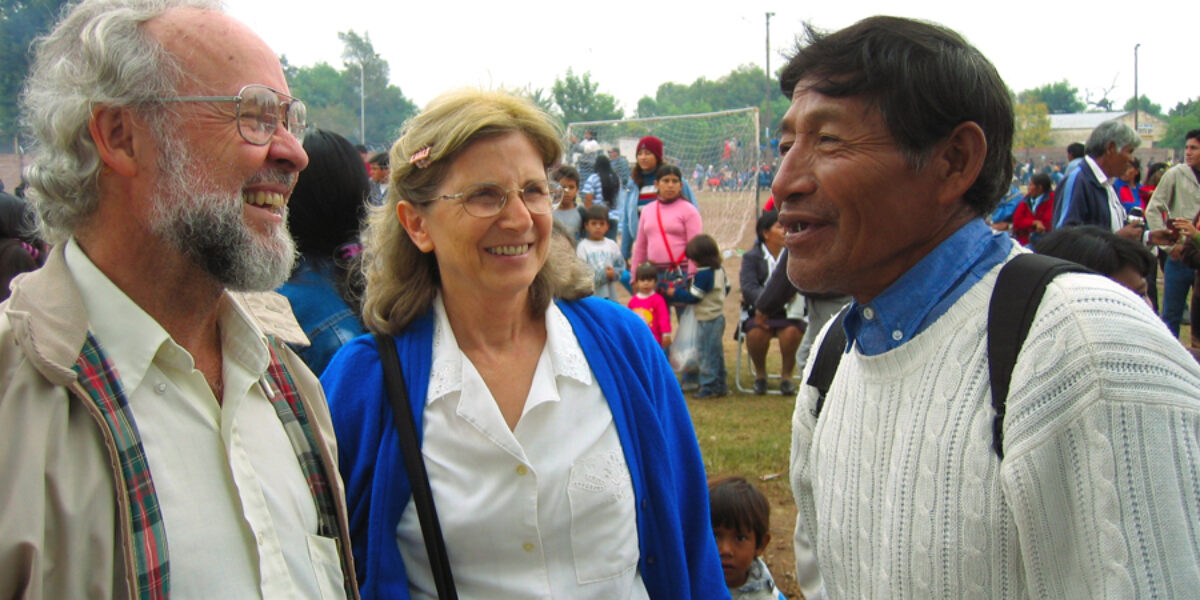GOSHEN, Ind. (Mennonite Mission Network) – Willis Gabriel Horst, 74, died at home on Sunday, Sept. 1, in Goshen, Ind.
His 38 years of ministry with his wife, Byrdalene, are characterized by a willingness to be a guest and learner as he lived and worked alongside the Toba Qom, Pilagá and Moqoit people of Argentina.
“Willis is a brother who loves many people, teaches, gives suggestions, consoles, seeks reconciliation amongst the brothers and sisters, and helps a person to grow and to walk independently,” said Rafael Mansilla in a letter of appreciation for Horst. Mansilla is a leader of his community in Argentina, a pastor in the Iglesia Evangelica Unida (United Evangelical Church), and member of the Toba Qom Bible translation team.
“He didn’t found a church, but he did lay the foundation for leaders—leaders who are defenders of their own matters and who can trace out their own paths,” said Mansilla.
In 1971, the Horsts arrived in the Chaco region of northern Argentina to serve with Mennonite Board of Missions, a predecessor agency of Mennonite Mission Network. The existing ministry work in the area aimed to strengthen ethnic identity and encourage truly indigenous expressions of church life.
The Horsts gave leadership to the Mennonite ministry as it expanded to become an international and interdenominational team. The team members related to indigenous congregations as equals walking together, and finding Jesus in each other’s stories. They didn’t plant Mennonite churches; instead, they supported indigenous churches as they discovered gifts, unique worship styles, and theology.
“I went out to help others convert to Jesus, and discovered that I was also converted in the process,” said Horst during a sermon at Bethel Mennonite Church in Rittman, Ohio, in 2005. “I realized that those to whom I had gone were already engaged in a spiritual journey long before Western missionaries ever arrived on the scene.”
Linda Shelly, director of Latin America for Mennonite Mission Network, remembers that Horst saw himself as a guest among the churches. “He shared with the broader church his clear belief that we as Mennonites, and Christians as a whole, will understand God’s message for us more fully when we seek to understand the insights of native peoples, as well as people of other cultures.”
Mattie Marie Mast, a missionary who served with her husband, Michael, alongside the Horsts in Argentina, described Horst’s faith.
“I especially appreciated Willis’s spirituality and his longing for more and more of the fullness of life and for the divine,” said Mattie Marie. “It was a spirituality of living each day, expectantly. His was a living faith, dynamic and creative.”
Horst developed a conversational style of Bible study known as a Bible Circle, in which people would draw from their own spirituality in exploring together the meaning of a biblical passage or theme in their culture.
In order to include more people in worship, Horst supported indigenous people as they translated Scripture and teaching materials into indigenous languages. These efforts at self-agency have led individuals and communities to engage in intercultural dialogue and to address matters of human rights, especially land claims.
Byrdalene and he also coordinated audio recordings of Scripture in the Pilagá language. For churches with rich oral traditions and an emerging electronic generation, these recordings offered a new way to experience the Gospels.
People touched by the Horsts’ work noticed their different attitude.
“I’ve worked with anthropologists, technicians, teachers, gone to conferences … but, you people, you made me feel like a person,” said Ignacio Silva to the Horsts. Silva is a Pilagá bilingual schoolteacher and a preacher in his church who helped read important parts for a recording of the Gospel.
Lawrence Greaser, former director of Latin America at MBM while Horst served, said, “Willis Horst was a compassionate advocate for the oppressed, conciliator, learner/teacher while sitting at the table of the others, friend, and good and faithful servant of the Lord.”
In a story told by Michael Mast, Horst combined a melody he heard in a Pilagá church service with the words of Mark 10:15 in the Pilagá language: “Whoever does not receive the kingdom of God as a little child will never enter it.”
“Later he introduced the song in a Bible study and it was immediately incorporated into the worship with great enthusiasm,” said Michael. “It became the theme song for the rest of the week of Bible studies in that area.”
The benefit of the fraternal missionary model in the Argentine Chaco led to the creation of the book “Misión sin conquista” (Mission without conquest). Horst co-authored the book with Ute Müeller-Eckhardt and Frank Paul, missionaries who served with the Horsts in Argentina for 12 years. The book, written in Spanish, illustrates the fraternal missionary model of the Chaco Mennonite team, describing their vision, stories and efforts to undo some of the original conquest of Latin America by Western Christianity.
Horst was born July 4, 1939, to Susie I. (Good) and Clarence K. Horst near Seville, Ohio. He studied at Goshen College and Goshen Biblical Seminary. On July 4, 1964, Horst married Byrdalene Wyse of Archbold, Ohio.
Beginning in 1964, the Horsts spent three years working on the Navajo reservation. They decided to answer God’s call to mission, and after two summers of linguistics training and one year of Spanish language study in Costa Rica, the Horsts left for Argentina in 1971 and served there until they retired to the United States in 2009.
Horst is survived by his wife and their four children, René (Marlene Harder) of Boone, N.C.; Carmen (Eric R. Kurtz) of Goshen; and Emily (Malcom Sedaca) and Cristina (Lucas Robert) of Cordoba, Argentina; and seven grandchildren: Matías, Tali, Francisco, Serafín, Khalil, Elisa and Rebeca.
Memorial services will be at 2 p.m. Saturday, Sept. 21, at Assembly Mennonite Church, Goshen, and at Iglesia Anabautista Menonita, Floresta, Buenos Aires, Argentina, on Nov. 2.
Memorial contributions may be made to Mennonite Mission Network.







